

Bitter Chocolate - End Slavery Now. Ivory Coast is the world's leading producer of cocoa, the raw ingredient for chocolate, and is responsible for about 36 percent of global exports.
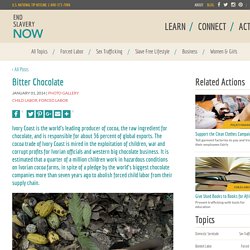
The cocoa trade of Ivory Coast is mired in the exploitation of children, war and corrupt profits for Ivorian officials and western big chocolate business. It is estimated that a quarter of a million children work in hazardous conditions on Ivorian cocoa farms, in spite of a pledge by the world's biggest chocolate companies more than seven years ago to abolish forced child labor from their supply chain. Nine-year-old Jean Baptiste doesn't attend school. Work begins at 8 a.m. and involves cutting cocoa fruit off the trees with a machete and removing the beans. The family has no other viable source of income. ©Daniel Rosenthal Two children returning to Meagui after working on a cocoa plantation. Near Sinikosson, this is a picture of the cocoa bean harvest. This woman is from Burkina Faso. Cocoa beans are being taken to Meagui. Slavery Today. Fairtrade Foundation. Cotton is the world’s oldest commercial crop and one of the most important fibre crops in the global textile industry.
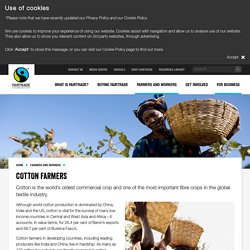
Although world cotton production is dominated by China, India and the US, cotton is vital for the survival of many low income countries in Central and West Asia and Africa – it accounts, in value terms, for 26.4 per cent of Benin’s exports and 58.7 per cent of Burkina Faso’s. Cotton farmers in developing countries, including leading producers like India and China, live in hardship.
As many as 100 million households are directly engaged in cotton production and an estimated 300 million people work in the cotton sector when family labour, farm labour and workers in ancillary services such as transportation, ginning, baling and storage are taken into account. For farmers, the challenges range from the impact of climate change, poor prices for seed cotton, through to competition from highly subsidised producers in rich countries and poor terms of trade.
Organic cotton - Risk of cotton faming. Environmental risks Cotton is mostly grown in monoculture and is a very pesticide-intensive crop.
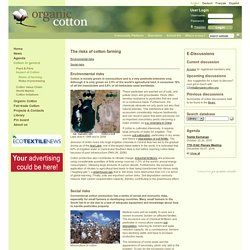
Although it is only grown on 2.5% of the world’s agricultural land, it consumes 16% of all the insecticides and 6,8% of all herbicides used worldwide. Lake Aral in 1989 and in 2008 These pesticides are washed out of soils, and pollute rivers and groundwater. Pests often develop resistance to pesticides that are used on a continuous basis. Does buying Fairtrade actually help farmers? Paradoxically, of the one billion people classified as food insecure by the United Nations, about 500 million are smallholder farmers in developing economies.
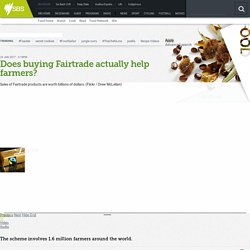
Cocoa Facts - Tribes And Nations. • The ICCO estimates that there are approximately 14 million people directly involved in cocoa production.
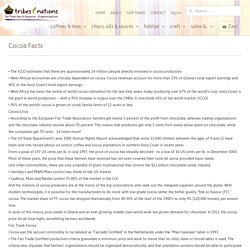
Make Chocolate Fair! The dark side of coffee: an unequal social and environmental exchange. The humble coffee bean is one of the most important and actively traded commodities in the world.
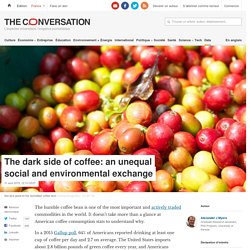
It doesn’t take more than a glance at American coffee consumption stats to understand why. In a 2015 Gallup poll, 64% of Americans reported drinking at least one cup of coffee per day and 2.7 on average. The United States imports about 2.8 billion pounds of green coffee every year, and Americans consume just over nine pounds of coffee per capita annually. If you’re anything like me, your morning coffee is a necessity, so early in my graduate career I decided to do a little research on it. How Tea is Processed. Tea facts - Tribes And Nations. Fair Trade Tea benefits • Working communities who are not fearful to unionise and consult with management. • A living wage for each worker. • Schools, clinics, dispensaries built as a result of the democratically decided use of the Fairtrade premium. • Pension schemes that allow workers to leave the estates post retirement.
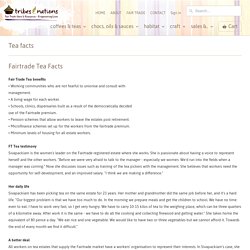
Say No To Palm Oil. Certified Sustainable Palm Oil (CSPO) CSPO represents the certification process where palm oil growers must commit to real credible sustainability standards through time-bound plans.
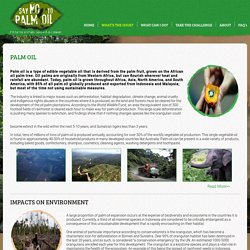
THE PALM OIL EXTRACTOR – Fairtrade Africa. Profile: Kuapa KokooProduct focus: Cocoa Location: Kumasi, Ghana Type: Smallholder – 74,000 farmers Fairtrade certified since: 1996 Contact: Maybel Addy – admin@kuapakokoo.com Challenge:A majority of Kuapa Kokoo’s members own only small areas of land.
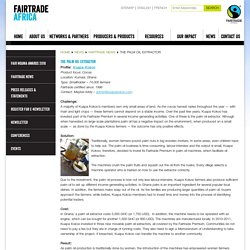
As the cocoa harvest varies throughout the year — with main and light crops — these farmers cannot depend on a stable income. Over the past few years, Kuapa Kokoo has invested part of its Fairtrade Premium in several income-generating activities. One of these is the palm oil extractor. Although when harvested on large-scale plantations palm oil has a negative impact on the environment, when produced on a small scale — as done by the Kuapa Kokoo farmers — the outcome has only positive effects. Fairtrade certification. In 2009, Fairtrade certified sales amounted to approximately €3.4 billion (US $4.9 billion) worldwide, a 15% increase from 2008.[2] Sales are further expected to grow significantly in the coming years: according to the 2005 Just-Food Global Market Review, Fairtrade sales should reach US$ 9 billion in 2012 and US$ 20-25 billion by 2020.[3] The Fairtrade industry does not reveal how much of this is extra profit to retailers and distributors in rich countries, how much is spent on Fairtrade’s own costs or how much reaches the farmer.
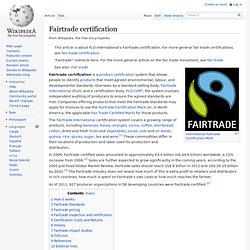
As of 2011, 827 producer organizations in 58 developing countries were Fairtrade certified.[2] How it works[edit] With Fairtrade coffee, and for instance, packers in developed countries pay a fee to The Fairtrade Foundation for the right to use the brand and logo, and nearly all the fee goes on marketing. Rainforest Alliance. The Rainforest Alliance harnesses market forces as part of its strategy to arrest the major drivers of deforestation and environmental destruction: timber extraction, agricultural expansion, cattle ranching and tourism. The organization trains farmers, foresters and tourism operators in sustainable practices that conserve land and waterways, improve livelihoods, and protect workers and communities; it also helps them access the financing necessary to implement sustainability changes.
Farms and forestry enterprises are audited against rigorous standards maintained by the Sustainable Agriculture Network and the Forest Stewardship Council — international NGOs the Rainforest Alliance helped to found. Those farms and forestry enterprises that pass both annual and surprise audits are certified by the organization and earn the right to use the Rainforest Alliance Certified seal. Tourism businesses that adopt established best management practices can use the Rainforest Alliance Verified mark. Veganism. Veganism /ˈviːɡənɪzəm/ is the practice of abstaining from the use of animal products, particularly in diet, as well as following an associated philosophy that rejects the commodity status of sentient animals. A follower of veganism is known as a vegan.
Distinctions are sometimes made between different categories of veganism. Dietary vegans (or strict vegetarians) refrain from consuming animal products, not only meat but, in contrast to ovo-lacto vegetarians, also eggs, dairy products, and other animal-derived substances. The term ethical vegan is often applied to those who not only follow a vegan diet, but who extend the vegan philosophy into other areas of their lives and oppose the use of animals or animal products for any purpose.[4] Another term used is environmental veganism, which refers to the avoidance of animal products on the premise that the harvesting or industrial farming of animals is environmentally damaging and unsustainable.[5] History[edit] Background[edit]
Shade-grown coffee. History[edit] Ecological impacts[edit] Species diversity[edit] Grass-fed beef. Veganism. Organic food. Organic vegetables at a farmers' market in Argentina Organic foods are produced using methods of organic farming. Currently, the European Union, the United States, Canada, Mexico, Japan and many other countries require producers to obtain special certification in order to market food as organic within their borders. In the context of these regulations, organic food is food produced in a way that complies with organic standards set by national governments and international organizations. Organic food production is a heavily regulated industry, distinct from private gardening. Fair Trade Your Supermarket: Leave a message on the shelf… Use our Praise and Persuade Fair Trade cards to let the supermarkets know you mean business when it comes to stocking and buying Fair Trade. The more cards we leave on grocery store shelves around the county, the more buzz we can create about Fair Trade among store employees and other shoppers.
Leave the cards on busy days, like Sunday, for even more attention! PRAISE: Place the “CHOOSE FAIR TRADE” cards next to Fair Trade products that your supermarket is carrying to thank them for supplying Fair Trade items and to encourage other consumers to buy Fair Trade products.Click here to download shelf cards as a PDF fileClick here to learn about Fair Trade Products and which Brands to Look For. Fair Trade:Fair Trade Products. What is Fairtrade...